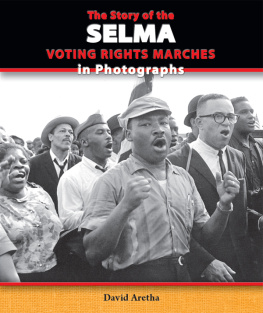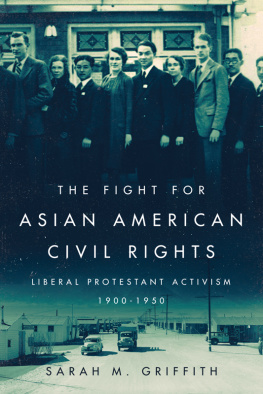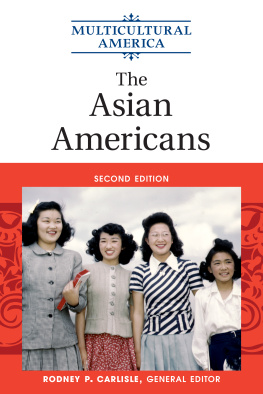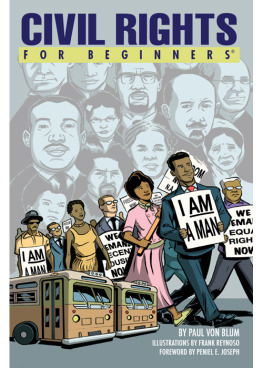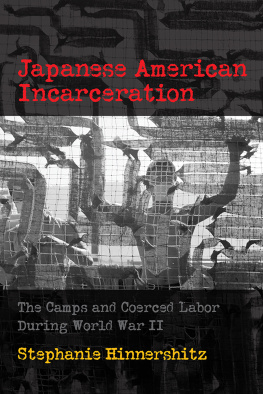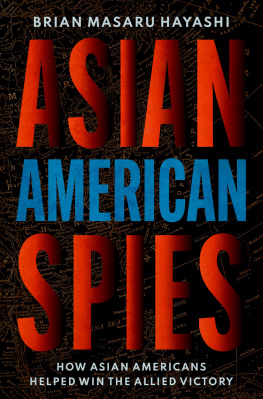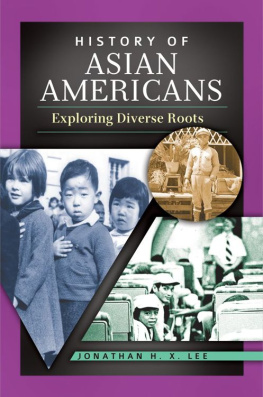A Different Shade of Justice
JUSTICE, POWER, AND POLITICS
Coeditors
Heather Ann Thompson
Rhonda Y. Williams
Editorial Advisory Board
Peniel E. Joseph
Matthew D. Lassiter
Daryl Maeda
Barbara Ransby
Vicki L. Ruiz
Marc Stein
The Justice, Power, and Politics series publishes new works in history that explore the myriad struggles for justice, battles for power, and shifts in politics that have shaped the United States over time. Through the lenses of justice, power, and politics, the series seeks to broaden scholarly debates about Americas past as well as to inform public discussions about its future.
More information on the series, including a complete list of books published, is available at http://justicepowerandpolitics.com/.
This book was published with the assistance of the Fred W. Morrison Fund of the University of North Carolina Press.
2017 The University of North Carolina Press
All rights reserved
Manufactured in the United States of America
The University of North Carolina Press has been a member of the Green Press Initiative since 2003.
Cover photo courtesy of the State Archives of Florida
Portions of Chapter 3 appeared previously in Stephanie Hinnershitz, The Little Brown Brother in the Jim Crow South: Race, Sex, and Empire in State of Georgia v. Fortunatio Annunciatio (1932), Journal of Southern History 82, no. 3 (August 2016): 54978. Reprinted with permission.
LIBRARY OF CONGRESS CATALOGING-IN-PUBLICATION DATA
Names: Hinnershitz, Stephanie, 1984 author.
Title: A different shade of justice : Asian American civil rights in the South / by Stephanie Hinnershitz.
Other titles: Justice, power, and politics.
Description: Chapel Hill : The University of North Carolina Press, [2017] | Series: Justice, power, and politics | Includes bibliographical references and index.
Identifiers: LCCN 2017003592 | ISBN 9781469633695 (cloth : alk. paper) | ISBN 9781469633701 (ebook)
Subjects: LCSH: Asian AmericansSouthern StatesHistory20th century. | Asian AmericansCivil rightsSouthern StatesHistory20th century. | Civil rightsSouthern StatesHistory20th century.
Classification: LCC E184.A75 H56 2017 | DDC 323.1195/073075dc23
LC record available at https://lccn.loc.gov/2017003592
Contents
Illustrations
Japanese American farmers and their families at Yamato Colony
George Morikami and Japanese American farmers at Yamato Colony
Chinese American students in Greenville, Mississippi
Chinese American students in Sunday school in Bolivar County, Mississippi
Philippine yo-yo experts in Jacksonville, Florida
Solicitor General E. A. Stephens in Atlanta
Map of fishing towns in the Gulf of Mexico region
Klan calling card from Texas
Remains of a Vietnamese American fishermans boat in Texas
American-owned-and-operated advertisement in Valdosta, Georgia
American-owned-and-operated advertisement on U.S. Highway 84 in Georgia
Acknowledgments
In many ways writing the second book was both challenging and a welcome change from writing the first. Many people have played important roles in seeing this project from beginning to end, and although I cannot mention everyone in these acknowledgments, this is an undertaking that I could not have completed without the help that I received along the way. Also, when I moved to Georgia from Maryland in 2013, I never would have imagined that I would be writing a book on Asian Americans in the South. While in graduate school and working on my dissertation, I always thought that if I were fortunate enough to receive a job offer, it would be from a school on the West Coast, considering my interests in Asian American history. As fate would have it, I ended up in Valdosta, Georgia, and, during my first semester there, I worried about funding for traveling to West Coast archives to work on a second project. When I took a gamble on searching through LexisNexis for court cases involving Asian Americans in the South, I began a journey that would take me through multiple southern states in search of Asian Americans who fought against southern discrimination and racism in the past.
First and foremost, the members of the editorial team at the University of North Carolina Press made this process as easy as possible and were always there to help talk through ideas and read multiple drafts. From day one, Brandon Proia made sure that the manuscript moved along and offered insight and help in the publishing process, and I am grateful for his support. The anonymous reviewers for the press also offered excellent and much-needed feedback that in the end made the book more complete and analytically sharp, and I thank them for their time and care in reading my work. I also would like to thank the editors of the Justice, Power, and Politics series, Heather Ann Thompson and Rhonda Williams, for their interest in my work and for their roles in creating an amazing series.
A team of scholars also contributed to this project either through reading drafts, offering comments, or providing friendly support. At the annual Southern Historical Association meeting, Francoise Hamilton changed my view of the project and helped me to get out of a conceptual rut by suggesting that I reconsider how I defined a civil rights movement. Similarly, audience members at the Association for Asian American Studies annual conference offered interesting questions and comments on what would become the third chapter of this book. And, as always, Julie Greene, Eiichiro Azuma, and Lisa Mar wrote letters of support and offered critical advice for moving the project along.
I am obligated to thank Valdosta State University for funding to complete research for this project, nothing more and nothing less.
Id like to thank the archivists and librarians at the Arkansas State Library, the Georgia Archives, the Hill Memorial Library Special Collections at Louisiana State University, the Mississippi Department of Archives and History, Delta State Universitys special collections, the State Archives of Florida, the Dolph Briscoe Center for American History at the University of Texas at Austin, the Austin History Center, the Nashville Public Library, the staff at the Portsmouth Circuit Court in Virginia, Benjamin Almoite at the Virginia State Law Library, and Judy Bruno at the Southern Poverty Law Center. Id also like to especially thank Morris Dees, Lee Duschoff, Michael Leven, H. P. Rama, and Ravi Patel for allowing me to conduct interviews with them for the final chapter. Your time was greatly appreciated, and I absolutely could not have written this book without you.
The Journal of Southern History graciously allowed me to reprint portions of Chapter 3 that were previously published in their journal.
As always, a big shout out to all of my family and friends who supported me along the way, but Id like to especially thank Bob and Rhonda Hutchinson for helping to pay for the permissions costs for the images found in Chapter 4.
And last, but not least, Rob Hutchinson deserves a mountain of praise for (once again) putting up with me as I wrote this book.
A Different Shade of Justice
Introduction
Ive never heard a political opinion from a Chinaman, African American civil rights activist and Mississippi Delta entrepreneur Amzie Moore recounted in a 1967 interview. Although Congress passed and enacted major pieces of legislation, including the Civil Rights Act of 1964 and the Voting Rights Act of 1965, Moore understood that there was still a long way to go on the road to equality and was more than a bit flustered over what he identified as Asian Americans lack of participation in the civil rights movement. A native of the Mississippi Delta born to sharecropping parents on a plantation near the small town of Grenada and later a store owner in Cleveland, Mississippi, Moore became a leader in the Regional Council of Negro Leadership, an organization that encouraged self-help and entrepreneurship among African Americans in Mississippi. While the 1955 murder of Emmett Till spurred Moore to action in the search for Tills body (where Moore and others learned that there were hundreds of unknown Emmett Tills whom whites had murdered and dumped in the swamps, bayous, and murky, slow-winding rivers of the Delta for decades and probably centuries), Moore was most comfortable in the economic arena of civil rights. Moore believed deeply in the value of small business and property ownership in uplifting black southerners and placing them on the path to equality. This was often difficult to accomplish in the Delta, the most southern place on earth, as journalists described the flat, cotton-bespeckled landscape of the area. Since the immediate postCivil War years, however, Chinese migrating to the region from the West Coast in search of business opportunities or to join other family members who lingered after brief stints as plantation workers during the early days of Reconstruction had a strong foothold in the small business scene in the Delta. Both African Americans and Chinese Americans shared this southern space and attempted to find their place in a racialized society as entrepreneurs and, more generally, as ethnic and racial minorities.
Next page

